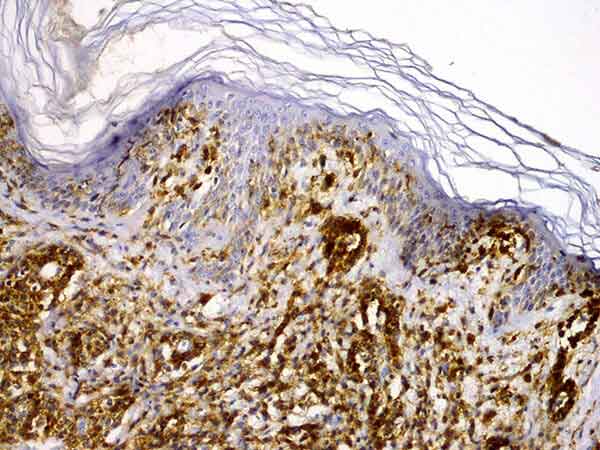
Brentuximab Vedotin Approved for Two Rare Lymphomas
December 18, 2017, by NCI Staff
The Food and Drug Administration (FDA) has approved brentuximab vedotin (Adcetris®) for the treatment of some patients with either of two types of non-Hodgkin lymphoma.
The approval was granted for the treatment of adults who have been treated previously for either primary cutaneous anaplastic large cell lymphoma(pcALCL) or CD30-expressing mycosis fungoides. Both diseases are rare cutaneous T-cell lymphomas(CTCLs) that start as rashes on the skin.
Brentuximab is a type of targeted therapy called an antibody–drug conjugate. The antibody component of the therapy binds to the protein CD30 on the surface of cancer cells, at which point the drug is released into the cells and kills them. Brentuximab was previously approved for the treatment of some patients with Hodgkin lymphoma, as well as for some patients with ALCL.
"CTCLs are chronic, progressive, and debilitating diseases," said Barbara Pro, M.D., of the Robert H. Lurie Cancer Center at Northwestern University, who was the lead investigator on a phase 2 study of brentuximab for patients with ALCL. "The approval of this novel treatment represents significant progress in the treatment of these diseases."
Trial Shows Drug is Effective and Safe
The approval was based on results from a phase 3 trial called ALCANZA that enrolled patients with mycosis fungoides or pcALCL that overexpressed the CD30 protein (CD30-positive) who had been previously treated for their disease. The 131 patients in the trial were randomly assigned to receive intravenous brentuximab or the physician's choice of methotrexate or bexarotene (Targretin®). The trial was funded by Millennium Pharmaceuticals and Seattle Genetics.
Although there are many treatment options for patients with these diseases—including methotrexate, bexarotene, drugs known as histone deacetylase (HDAC) inhibitors, and multidrug chemotherapy regimens—these therapies "rarely provide reliable and durable responses," wrote the study investigators.
In the trial, 56% of the patients in the brentuximab group had an objective response that lasted at least 4 months, compared with 12% of the physician's choice group. In addition, 16% of those who received brentuximab had a complete response to the treatment, compared with 2% of those who had physician's choice.
The median progression-free survival (PFS) of those who had brentuximab was 17 months, whereas median PFS for those in the physician’s choice group was 4 months.
"These improvements—especially, the substantially longer PFS—with brentuximab vedotin compared with the physician's choice, are important," said Christopher Melani, M.D., of the Lymphoid Malignancies Branch in NCI's Center for Cancer Research.
"These are impressive findings, and physicians should strongly consider this drug when treating patients with CD30-positive disease," he said.
The study results also showed that patients in the brentuximab group had a greater reduction in symptoms than those in the other group.
The symptoms caused by CTCLs can greatly diminish patients' quality of life, added Dr. Pro. So, in addition to the clinical responses to brentuximab, she continued, "a significant reduction in symptoms [is] very important for this patient population."
Brentuximab can have serious side effects, however. For example, 44 of the 66 trial participants who were treated with brentuximab experienced peripheral neuropathy, and nine of them discontinued the drug because of this side effect.
Some of the other most common side effects were nausea, diarrhea, and fatigue.
Future Research into Brentuximab
In an editorial accompanying the ALCANZA results, Pierluigi Porcu, M.D., and Joya Sahu, M.D., of Thomas Jefferson University, wrote that the trial results represent "a major milestone in the development of effective systemic therapies for cutaneous T-cell lymphoma."
The next steps, they continued, will include assessing brentuximab as an earlier line of therapy, as well as testing it in combination with other drugs. Dr. Melani agreed that further research is needed to determine whether the complete response rate and PFS might be improved if brentuximab is used with other treatments.
"Combining this agent with other effective therapies, such as skin-directed therapy [including topical steroids and retinoids], HDAC inhibitors, and/or standard chemotherapy, will likely be tested to see if we can improve on the complete response rate and PFS and provide more durable remissions for patients," he explained.

































No hay comentarios:
Publicar un comentario